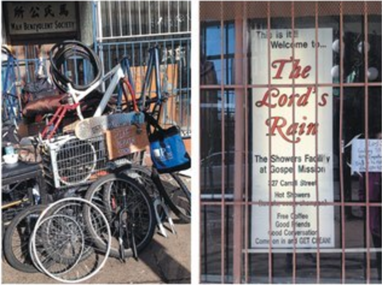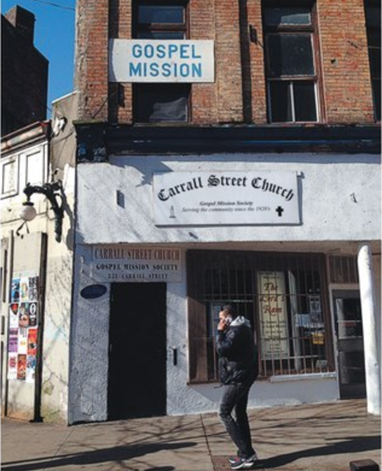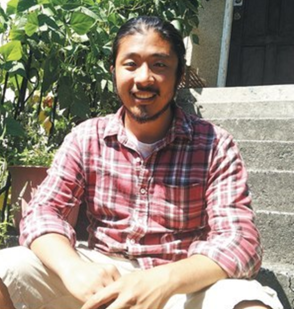Faith Today visits Vancouver’s Downtown Eastside to understand what it is like to minister in this hard, hard place.
Listen to our podcast
This place is beyond the law. Or perhaps above it.
Most days a black market thrives – as only broken things can – with a limp and a shuffle. On either side of West Hastings Avenue, people lay books, socks, old cellphones and other random items in neat little rows on quilts and picnic blankets. Unattended merchandise appears in random piles up and down the street.
 A dishevelled woman sells danishes and doughnuts, while a man sets up a makeshift bicycle shop. Others hawk DVDs and jewelry.
A dishevelled woman sells danishes and doughnuts, while a man sets up a makeshift bicycle shop. Others hawk DVDs and jewelry.
It could be any outdoor Canadian community market, if it weren’t for the brokenness palpable in the air. The smell of urine is overwhelming. The style du jour is stained baseball caps, baggy jackets and oversized pants. This is Vancouver’s Downtown Eastside (DTES) – a three-block radius of desperation and sadness, but amazingly a place where flowers still bloom.
Next to the illegal street market is an illegal garden of sorts. Ten years ago Christians broke the lock on this discarded property "as a prophetic announcement of God’s new life breaking into abandoned, dead spaces" (as recorded in an obscure YouTube clip). The gardeners took over the lot without knowing who owned it.
"We thought the last way to find the owner was to illegally garden the property," says one young gardener on the video. "Isaiah the prophet cast this vision of just living, and he said there will be those among you that restore the streets to dwelling. It’s this idea of restoring waste places. Of turning it into these gardens that provide food."
After four years, a local church has taken on the mantle of caring for the garden. It’s fitting to such a transitory neighborhood. Change and motion are constant here.
"IT’S SO DIFFERENT in the daytime," Cheryl Sutton keeps telling me. "It’s so different. At nighttime, that’s really when everyone is awake and out." Sutton has been coming down to volunteer with Carrall Street Church and to minister in the evenings for over a year. She’s taking me through the streets known widely as "Canada’s poorest postal code" on this sleepy Wednesday morning. But as far as I can tell, there is no sleepy quality about this half-block of informal business and wrangling. The illegal street market bustles. It is loosely organized with its own systems and hierarchies. The odd middle-class customer wanders from stall to stall. (Some middle-class folks know that here, you can get things for cheap. Just don’t ask questions.)

We walk into the Downtown Eastside Women’s Centre. There’s a basket of free condoms at the welcome desk. Women mill about, waiting for the afternoon meal. And for Sutton, there’s the familiar welcoming embrace of Chilli Bean, a regular volunteer at the centre. She’s a twinkling, maternal woman, probably in her fifties, with a gap-toothed smile and long black hair.
There are no men at the women’s centre, and I noticed earlier there were virtually no women in the lineup for lunch at the Salvation Army’s drug and recovery centre just half a block away. Gender segregation seems to be a necessity for survival here. Perhaps there is safety in homogeneity when the threat of violence hangs in the air so palpably.
"We see a lot of new faces now that springtime is coming. From across Canada. And young ones too," Chilli Bean tells us. "It’s sad."
I am impressed by Chilli’s warmth, her care, her smile. "Chilli Bean is a high-functioning drug user," Sutton tells me later. This is how it is – addiction and illness, mingled with the most human of emotions and distinctly human of interactions.
"THERE WAS A GUY," Karen Giesbrecht confesses. "I thought he was cute. So I came to volunteer." Much about Giesbrecht is casual and understated, yet the adventure that began 15 years ago – almost on a whim, with one simple visit to a Tuesday night shelter and meal ministry – is anything but casual. In the light behind her grey eyes, you glimpse the precocious young adult she would have been back then.
Today the 38-year-old juggles three related part-time jobs – dietician for one of the Salvation Army’s drug and recovery centres in the DTES, meal co-ordinator at a local church, and co-ordinator for City Gate Leadership Forum, a nonprofit that helps congregations, charities and changemakers who want to work with the poor for the well-being of the city.
So a college-age crush on a fellow volunteer first brought her, a middle-class girl from the ’burbs, to serve in this rough-and-tumble neighborhood. After a circuitous journey from two years in Jamaica to a six-year stint in corporate Vancouver, the grace of God eventually anchored her here.
The cute guy is long gone – he went to be a missionary overseas – but Giesbrecht is still here. In such a transient neighborhood, this is a feat. It takes a unique brand of longevity to be able to deal with the vicissitudes of addiction, chronic poverty and mental illness. But Giesbrecht is fixed on being that regular element in her homeless and recovering friends’ lives.
Jolene Ricci is also in it for the long haul. She worked for almost five years as an outreach worker at Union Gospel Mission on East Hastings. Like Giesbrecht and Sutton, she began as a volunteer, serving coffee and cleaning up. Ricci remembers feeling a bit awkward with the DTES population.
"But once you establish a connection with them, that’s when it’s really rewarding," she says. "They would come in, some of them really dark and not talking. You could see they came out of their lonely home. We’d have a meal and eventually they’d leave a different person than how they came in."
It’s important to celebrate the little victories here. Lost jobs, lost spouses, lost children and lost homes are a constant theme, according to Ricci. Setbacks are unforgiving. So friendship has to be.
Ricci is a hairdresser. She maintains personal friendships with guests from Union Gospel Mission’s various programs. In her stylish loose brown sweater and grey tights, it’s hard to imagine her befriending DTES residents. But through free haircuts, meals, hospital visits and mostly just time spent, she has forged strong bonds.
One of these bonds is with Antoinette and her baby Ania (not their real names). "I just went to Ania’s first birthday!" says Ricci. "Antoinette probably still steals occasionally. I don’t even want to know exactly what goes on. But she’s definitely not using anymore and she’s a really good mother. She put on a birthday party like I could never do. Decorated, in her building, with treat bags for everyone."
Ricci first met her on a professional basis, when she was her caseworker. Antoinette’s mother (also struggling with addictions) had asked her to look out for Antoinette on the streets. A few weeks later their paths crossed. Their friendship bloomed as friendships will on the DTES, in fits and starts with interruptions long and short.
"There are some people who just want stuff from you," Ricci says. "But even when Antoinette was in prison, sending me letters, I would have a sense that she enjoys our relationship. She knows I care about the people in her life."
Recently, Antoinette has become stable. But in this neighborhood, that’s no guarantee of a stable future.
"There are so many crazy stories," says Ricci. "You hear about the most horrific lives that people have led. But it’s satisfying to know that you’re able to bring some inspiration or hope. You are able to love people who don’t know they are loved. To pay attention to people who need it."
IF THERE IS ONE pattern among the ministry workers here, it’s that long-term, invested interest in the lives of DTES residents makes the largest difference. Karen Giesbrecht points out the difference between relief work and development work. Relief work seeks to swoop down to provide short-term charity. Development work seeks to come alongside people and walk with them into fullness of life.
"There are so many faithful servants of the Lord working in the trenches here," Sutton says. "These folks sacrifice time, money, heartaches and sometimes verbal abuse over the years, working the streets that seem to never change. For me, I’ve come to learn and am still learning one soul at a time. One sheep at a time."
Sutton sends me a list of over a dozen pastors and volunteers to speak to, to understand more. The net of grace God has cast over this, Canada’s poorest postal code, is far wider than I had imagined. Its arms snake through the squalor, the brokenness, the unredeemable pieces, somehow weaving around the pieces to make a comprehensible whole.
"The other day," Giesbrecht tells me later, "I just saw Paul who is homeless – his hair is one big mat and he’s at most of our meals – and Eloisa is sitting there beside him holding her baby. They were chatting." Giesbrecht shakes her head. "The fact someone as kind and good and gentle as Eloisa would keep coming back. What else would put a young mom and her four-month-old sitting next to a homeless guy?"
So many of the dedicated volunteers and workers continue to come back here, even when addictions take over and it feels like friends take two steps back for every step forward. The common theme is how broken we all are, how close to the edge we are in our sinfulness and desperation.
30 years on the street: Andrew’s story
At my first visit to Karen Giesbrecht’s meal program, I sat and ate with DTES residents and met a man named Andrew (not his real name). I told him I was there to collect stories.
He grabbed a sheet of paper and started writing, laboriously, biting his lip in fierce concentration. Just watching his effort made me want to cry. Finally he slid the paper across the table. In large shaky print, scrawled across one sheet of foolscap, were these words:
My Name is Andrew Peter Kimmel
Born April 4, 1970
Father) Workaholic
Mother) Violent Alcoholic
Education) Grade 6
Family members
1 older Brother
Being across Canada
this is home
and I don’t lye that much.
Then through a wide-gapped smile, chipped teeth and distracted motions, he told me, "I’m a wide variety kind of guy. I’ve lived 30 years on the street. I have a home now. It’s nice. I get to volunteer and be social, and have no fights with people. You’ll have to come back for my story."
This Monday night meal group was his community, his people, he said. After dinner the community would extend to Bible study, led that night by two young seminary students who affectionately called this their own small group.
I returned a few months later on another Monday night, hoping to see Andrew and gather the rest of his story. But Giesbrecht told me she hadn’t seen him around lately.
"Andrew was doing really well for a while," she said. Like many of the crew at the meal ministry, he had managed to get back on his feet and was doing some meaningful work. But either his health or his addiction had caused setbacks.
"Andrew’s made a couple of the most eloquent speeches. If he had a better start in life, with his big heart, he would be preaching," said Giesbrecht.
"He has almost no teeth," I mused out loud.
Giesbrecht sighed. "When you stop caring for your teeth, that’s when you stop caring for yourself. When you have to worry about how to pay your bills, it’s the equivalent of knocking you down ten IQ points. It takes so much energy to worry about making ends meet when you are just coping. Your resilience goes down quickly. It’s not just a matter of getting a job. It’s identity. To work gives us identity and routine."
She illustrated with Andrew’s backstory. "Andrew couldn’t get a job and he couldn’t get a bank account because he didn’t have a birth certificate. So we went to the computer and downloaded a form to apply for one. It was 85 bucks, which for him was completely insurmountable. So through the church we got permission to pay it. We filled it out online. Two weeks later it arrived on his doorstep." She chuckled sadly. "I think he lost it several months later."
So that’s what Andrew wrote for me on that slip of paper. A birth certificate of sorts. An identity. –JULIA CHEUNG
"That could have been me," is a repeated chorus. "I could have seen myself slide down the precipice of addiction or depression if not for the grace of God. So I keep coming, praying, hoping." coming, praying, hoping. That is the way most of these workers and volunteers approach their ministry here. It is the way of Christ, the way of one friendship at a time, happening through the city. Where politics and controversies continually float above your head, the quietly obedient stride on.
This is in beautiful Vancouver, B.C., where Canadian dreams come true. But so do Canadian nightmares. A breathtaking backdrop of mountains meeting ocean points to the creative brilliance of its Designer, alongside the smell of urine, broken needles and trash that point to the brokenness of His people.
This is a neighborhood where striking natural beauty and the trendiest restaurants are found next to creaky old grocery carts, dishevelled beards and limp limbs. Ironically, the beards that seem to be everywhere in this neighborhood are signals of both hipster style and DTES poverty, depending on who is growing them. Personal upkeep is a low priority when your next meal is a larger concern.
I watch the urban gardeners YouTube clip again. The pathos of tending new life in a place that refuses to change, refuses to grow, is intriguing. "There are bees in time for the blackberry bloom," the young gardener points out. "And the whole entrance is flowers. We wanted the lane side to be flowers on both sides."
Hope is creeping into Canada’s poorest postal code – one long-term volunteer, one blackberry bush, one incremental life change at a time.
“If not for the hope in Christ, I’d be long gone”
Ryan Tang is a recent graduate of the University of British Columbia now interning with Servant Partners Canada in the DTES. Previously he worked as a shelter co-ordinator for Tenth Church’s Out of the Cold ministry and spent two months experiencing the slums of Calcutta. Follow his story on his website BeyondTheGreatWalls.com. He spoke with Faith Today writer Julia Cheung. 
Q. How did you fall into working in the DTES?
Ryan Tang: I ended up working here as a result of my experiences interacting with the poor, particularly through my encounter with Harris, a man who could have been mentally ill, homeless, a drug addict or all three. He could barely read, but tried to read the Bible to me. He knows he is loved by Jesus, and loves Jesus more than I have ever understood.
The second reason was my own deep desire to see God bridge the different realities of Vancouver. I was a UBC student who attended an upper-middle-class church, but just a stone’s throw away there was an entire area where people lived a completely different reality. This broke my heart and put me in a place of asking God, How can this be? So I went to see.
Lastly, I felt God invite me to be changed. There was a promise that seeking the welfare of the city was indeed seeking my own. I knew I wanted to be part of something where I’d need God. So I felt the need to respond to God’s invitation.
Q. What is the best part of working here?
RT: People. I love interacting with people and here, the degree of openness, transparency and just casual care I’ve received is phenomenal, unlike anywhere else. When I first arrived, people were informing me of the best places for free meals, or services for myself (and my children, if I had any!). Volunteers, homeless, addicts and just a whole mosaic of diversity! Just to be able to interact with such a dynamic diversity of people has proven one of my greatest honours in this place.
Q. What is the worst part of working here?
RT: The worst part I’d say is two-fold. One is sustainability. As an incarnational ministry, we need to live in the neighbourhood, and gentrification is really making that harder and harder as rent prices increase, and affordable goods and services are moving. The second part is simply hope. After hearing many stories of trauma and seeing the faces of many of those currently suffering, my own humanity is bruised. If not for the hope in Christ, I’d be long gone out of the DTES, as the burdens are certainly hard to bear. There have been nights where I’ve come home and burst into tears at the painful realities of people I’ve encountered, and their own lack of hope. How much I need Christ to be my strength.
Q. If there were one thing you’d wish middle-class Christians knew about working with this population, what would it be?
RT: There is beauty in this place. In the face of brokenness, there is beauty. So I simply encourage those working with this population to see the beauty in the people made in the image of God, and humbly love as we would Christ, and allow ourselves to be transformed as we seek the transformation of the DTES.
Julia Cheung is a freelance writer in Vancouver, B.C.